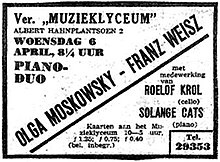Franz Weisz

Franz Weisz (born August 2, 1893 in Budapest , Austria-Hungary as Ferenc Weisz ; died September 30, 1944 in Auschwitz concentration camp ) was a Hungarian-Dutch pianist and composer.
Life
Ferenc Weisz studied piano with István Tomka (1855–1923) and composition with Károly Aggházy at the Nemzeti Zenede in Budapest . After the end of the war he got a position at the conservatory, but in 1920 after the defeat of the Hungarian Soviet Republic he emigrated to the Netherlands, where distant relatives of his lived. From then on he called himself Franz Weisz and in 1932 he received Dutch citizenship . Between 1925 and 1934 he was married to his piano student and artist Henriette Roos (1903–1992). He was friends with the composer Dirk Schäfer and wrote a short biography about him posthumously.
Weisz worked in Amsterdam as a freelance music teacher and composer. He composed for piano in chamber music arrangements, but also for symphonic orchestra. In 1929 five of his works appeared in print in Budapest. Little of his compositions is completely preserved.
He often played with the violinists Alfred Indig and Alexander Moskowsky, and with Olga Moskowsky he gave the Dutch premiere of Darius Milhaud's suite Scaramouche in the version for two pianos in 1938 . In 1938 Weisz became assistant to the Russian pianist Alexander Borovsky , but Borovsky fled to the United States in 1940, while Weisz stayed in the Netherlands. In May 1943 he was arrested and deported to the Westerbork transit camp. In January 1944 he came to the Theresienstadt ghetto , where he briefly took part in the prisoners' music activities, where he accompanied the Czech violinist Karel Fröhlich at a performance. At the end of September 1944, Weisz was deported to the Auschwitz concentration camp and murdered.
Works (selection)
- Franz Weisz, Guido Adler: Ter Herinnering aan Dirk Schäfer 25 Nov. 1873 - 16 Febr. 1931 . Amsterdam: Wereldbibliotheek, 1932
- Compositions
- Concert étude for piano 1913
- Suite for piano 1922
- Nocturne for piano 1924
- 5 pieces for piano (Rózsavölgyi, 1929)
literature
- Henri Nijsten: Alexander Borovsky and his assistant Franz Weisz , in: EPTA Piano Bulletin, September 2011
Web links
- Annette de Klerk: Franz (Ferenc) Weisz (1893-1944) , at Leo Smit Foundation
- Ferenc Weisz , at: musiques-regenerees
- Ferenc Weisz , at: joods amsterdam
| personal data | |
|---|---|
| SURNAME | Weisz, Franz |
| ALTERNATIVE NAMES | Weisz, Ferenc (maiden name) |
| BRIEF DESCRIPTION | Hungarian-Dutch pianist and composer |
| DATE OF BIRTH | August 2, 1893 |
| PLACE OF BIRTH | Budapest |
| DATE OF DEATH | September 30, 1944 |
| Place of death | Auschwitz concentration camp |
